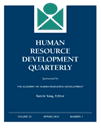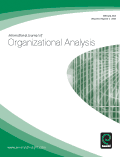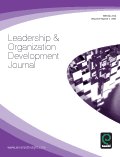
Journal of Managerial Psychology
Scope & Guideline
Bridging theory and practice in managerial psychology.
Introduction
Aims and Scopes
- Organizational Behavior and Employee Engagement:
The journal explores various factors influencing employee engagement, motivation, and satisfaction in the workplace, emphasizing the importance of leadership styles, organizational culture, and interpersonal relationships. - Leadership and Management Practices:
A core focus is on the dynamics of leadership, including transformational leadership, ethical leadership, and coaching leadership, examining their impact on employee performance and organizational outcomes. - Workplace Relationships and Social Dynamics:
Research often investigates interpersonal relationships at work, including mentorship, workplace ostracism, and social support systems, to understand their effects on employee behavior and organizational climate. - Work-Life Balance and Employee Well-Being:
The journal addresses the intersection of work and personal life, analyzing factors that contribute to work-life balance and their implications for employee health and productivity. - Psychological Safety and Organizational Justice:
It emphasizes the significance of psychological safety in fostering open communication and equitable treatment within organizations, contributing to improved employee voice and participation. - Innovation and Change Management:
The journal also explores how psychological factors influence innovation, adaptability, and change management within organizations, particularly in response to external pressures and crises.
Trending and Emerging
- Impact of Technology on Work Engagement:
There is a growing emphasis on how technological innovations, such as GenAI, influence employee engagement and organizational practices, showcasing the need for humanizing technology in the workplace. - Mindfulness and Well-Being Initiatives:
Research on mindfulness practices and their effects on employee well-being and performance is trending, indicating a heightened awareness of mental health in the workplace and the role of mindfulness in leadership. - Diversity, Equity, and Inclusion (DEI):
Increased attention is being paid to DEI initiatives and their impact on workplace culture and employee behavior, reflecting a societal shift towards more inclusive organizational practices. - Complex Interpersonal Dynamics:
Emerging studies are focusing on complex interpersonal dynamics, such as the effects of abusive supervision and workplace ostracism, highlighting the nuanced relationships between leaders and employees. - Coaching and Developmental Relationships:
There is an upward trend in research exploring coaching as a developmental tool, examining its impact on leadership effectiveness and employee growth, indicating a shift towards nurturing talent within organizations.
Declining or Waning
- Traditional Theories of Motivation:
There has been a noticeable decline in papers focusing on classical theories of motivation, such as Maslow's hierarchy of needs, as researchers increasingly seek to explore contemporary frameworks that better capture the complexities of motivation in modern work environments. - Static Leadership Models:
Research centered around static models of leadership is waning, with a shift towards dynamic and contextual approaches that consider the fluidity of leadership roles and styles in rapidly changing organizational landscapes. - Focus on Individual Traits:
There is a decrease in studies primarily focused on individual personality traits and their direct impact on workplace outcomes, as more attention is now given to contextual factors and relational dynamics. - Crisis Response Mechanisms:
Research specifically targeting crisis management responses, particularly in the context of COVID-19, appears to be declining as the focus shifts towards long-term recovery and resilience strategies. - Conventional Organizational Structures:
Papers that examine traditional organizational hierarchies and structures are becoming less frequent, as interest grows in more fluid, agile, and team-based approaches to management.
Similar Journals

JOURNAL OF APPLIED PSYCHOLOGY
Shaping the future of psychology through evidence-based research.JOURNAL OF APPLIED PSYCHOLOGY, published by the American Psychological Association, is a leading peer-reviewed journal in the field of applied psychology, with a distinguished legacy dating back to 1917. Renowned for its commitment to advancing the understanding of psychological principles in real-world contexts, this journal occupies a prestigious position as evidenced by its Q1 ranking in applied psychology and a remarkable 97th percentile in Scopus rankings, standing at 6th among 249 journals in its category. The journal publishes high-quality research that addresses critical issues faced by individuals, organizations, and communities, thereby contributing valuable insights to both academic and practitioner audiences. With no open access options available, it remains exclusive to subscribed institutions, ensuring rigorous peer review and high standards of publication. Researchers, professionals, and students will find a wealth of knowledge and innovative ideas in each issue, making it an essential resource for those seeking to enrich their understanding of applied psychological practices.

Journal of Management & Organization
Connecting scholars to transformative ideas.Welcome to the Journal of Management & Organization, a premier academic journal published by Cambridge University Press that serves as a vital platform for the dissemination of high-quality research in the fields of Business, Management, and Organizational Behavior. With an ISSN of 1833-3672 and an E-ISSN of 1839-3527, this prestigious journal has been converging scholarly insights since 1995 and continues to influence thought leadership until 2024. Recognized for its rigor, the journal holds a commendable position in the 2023 category quartiles, ranking Q2 in both Business and International Management and Organizational Behavior and Human Resource Management. Its impressive Scopus rankings affirm its significance, with ranks of #50/230 and #103/443 respectively. The Journal of Management & Organization is dedicated to advancing understanding, fostering innovation, and promoting best practices among scholars, professionals, and students alike, providing an essential resource for those aspiring to drive impactful change in the organizational landscape.

Journal of Personnel Psychology
Empowering Professionals with Evidence-Based PsychologyThe Journal of Personnel Psychology, published by HOGREFE PUBLISHING CORP, is an esteemed academic journal dedicated to disseminating high-quality research and insights in the fields of applied psychology, organizational behavior, and human resource management. With an ISSN of 1866-5888 and an E-ISSN of 2190-5150, this journal aims to foster a deeper understanding of psychological principles applied within workplace settings. Boasting a 2023 category rank of Q2 in both Applied Psychology and Organizational Behavior, the journal reflects its pivotal role in advancing scholarly discourse. Open access options allow for broader engagement with its content, making research findings accessible to a global audience. As researchers, professionals, and students navigate the complexities of human behavior in organizational contexts, the Journal of Personnel Psychology remains an invaluable resource for theoretical exploration and practical application, covering innovative topics and methodologies from 2010 to 2024.

GROUP & ORGANIZATION MANAGEMENT
Unraveling the Complexities of Team DynamicsGROUP & ORGANIZATION MANAGEMENT, published by SAGE Publications Inc., stands as a premier interdisciplinary journal focusing on the dynamics of groups and organizations within the fields of applied psychology, organizational behavior, and human resource management. With a distinguished Q1 ranking across multiple categories—specifically, Applied Psychology, Arts and Humanities, and Organizational Behavior and Human Resource Management—this journal is acclaimed for its rigorous peer-reviewed research and impactful contributions. The journal aims to promote scholarly dialogue and practical advancements that enhance understanding of group processes and organizational phenomena. With its long-standing history—from its inception in 1976 to the present—and a notable Scopus Rank that places it within the top tiers of its category, GROUP & ORGANIZATION MANAGEMENT is essential reading for researchers, practitioners, and students who are keen on exploring innovative theories and applications within this critical field.

Human Resource Development Quarterly
Pioneering Research for Effective Human Resource DevelopmentHuman Resource Development Quarterly, published by Wiley Periodicals, Inc., stands as a leading journal in the domains of Human Resource Development and Organizational Behavior. Since its inception in 1990, it has significantly contributed to the scholarly discourse, achieving prestigious Q1 rankings in both Arts and Humanities (miscellaneous) and Organizational Behavior and Human Resource Management categories as of 2023. With an exceptional standing reflected in its Scopus rankings—26th in Arts and Humanities and 41st in Business, Management and Accounting—the journal serves as a vital resource for researchers, professionals, and students dedicated to advancing knowledge and practice in the field. While currently not an open-access journal, its rich content remains accessible through institutional subscriptions, ensuring that key insights and innovative research remain at the forefront of the industry. The Human Resource Development Quarterly continues to foster rigorous inquiry and practical applications, making it an essential read for those engaged in the evolving landscape of human resource practices and development strategies.

Gedrag & Organisatie
Fostering Scholarly Dialogue on Organizational ChallengesGedrag & Organisatie, published by UITGEVERIJ LEMMA B V in the Netherlands, serves as a vital platform for scholars and practitioners in the fields of Organizational Behavior, Human Resource Management, and Social Psychology. With an ISSN of 0921-5077 and an E-ISSN of 1875-7235, this journal aims to foster scholarly dialogue and research dissemination from 2008 to 2024. Despite its current standing in the Q4 category across various rankings, including Organizational Behavior and Human Resource Management and Social Psychology, Gedrag & Organisatie plays a crucial role in introducing emerging theories and practical insights that can influence organizational practices and social dynamics. Researchers and students interested in the intersection of human behavior and management strategies will find the journal a rich resource for understanding contemporary challenges and advancements in these domains. The journal does not currently offer Open Access options, making it pivotal for institutions and individuals focused on subscription-based research access.

International Journal of Organizational Analysis
Elevating understanding of organizational behavior.International Journal of Organizational Analysis, published by Emerald Group Publishing Ltd, is a prestigious academic journal dedicated to advancing the fields of Organizational Behavior, Human Resource Management, Strategy, and Management. With an ISSN of 1934-8835 and an E-ISSN of 1758-8561, this journal holds a significant position in the academic landscape, marked by a 2023 Scopus ranking of Q2 in both Organizational Behavior and Human Resource Management (Rank #56/230) and Strategy and Management (Rank #140/478). The journal's commitment to fostering research excellence is evident as it converges insights from the years 2005 to 2024, providing a platform for innovative discussions that enhance understanding of organizational dynamics. Although it does not offer open access, its relevance and impact are undeniable, appealing to researchers, professionals, and students alike who are eager to explore cutting-edge organizational theories and practices. Situated in the heart of the UK in Leeds, the journal continues to be an essential resource for those dedicated to the study and application of organizational analysis.

JOURNAL OF OCCUPATIONAL AND ORGANIZATIONAL PSYCHOLOGY
Connecting theory and practice for impactful change.JOURNAL OF OCCUPATIONAL AND ORGANIZATIONAL PSYCHOLOGY, published by WILEY, stands as a leading platform for scholarly research in the fields of applied psychology and organizational behavior. Since its inception in 1992, this reputable journal has been dedicated to advancing the understanding of psychological principles in workplace settings, providing a critical resource for researchers, professionals, and students alike. With an impressive impact factor and consistently ranked in the top quartiles (Q1) in both applied psychology and human resource management, it ranks #28 out of 230 in its category within Scopus, highlighting its significance and reach within the academic community. While the journal is subscription-based, it ensures broad accessibility to pivotal findings that spark innovation in organizational practices and employee well-being. Featuring empirical research, theoretical work, and case studies, the JOURNAL OF OCCUPATIONAL AND ORGANIZATIONAL PSYCHOLOGY is essential for anyone looking to deepen their understanding of the psychological complexities of work and the forces shaping organizational dynamics.

PERSONNEL REVIEW
Elevating the discourse on workplace dynamics.PERSONNEL REVIEW is a premier academic journal published by Emerald Group Publishing Ltd that has garnered a significant reputation in the fields of Applied Psychology, Industrial Relations, and Organizational Behavior and Human Resource Management. With its inception in 1971, the journal has maintained a robust Q1 ranking across these categories as of 2023, showcasing its influence and relevance in contemporary research. Boasting an impressive Scopus rank—3rd among 60 in Industrial Relations and 45th among 230 in Organizational Behavior—PERSONNEL REVIEW serves as a crucial platform for disseminating cutting-edge research and fostering discourse among academics, professionals, and students alike. Although not an open-access journal, it provides valuable insights and rigorous analysis, helping to bridge theory and practice in human resource management and organizational studies. With a commitment to advancing knowledge and improving workplace dynamics, this journal is an essential resource for anyone invested in the human dimensions of work.

LEADERSHIP & ORGANIZATION DEVELOPMENT JOURNAL
Elevating Organizational Practices Through Scholarly InsightsLEADERSHIP & ORGANIZATION DEVELOPMENT JOURNAL is a premier scholarly publication dedicated to exploring transformative leadership practices and their implications for organizational development. Published by Emerald Group Publishing Ltd in the United Kingdom, this journal has established itself as a vital resource in the fields of Business, Management, and Organizational Behavior. With a notable impact factor and recognized status as a Q1 journal in both Business, Management, and Accounting (miscellaneous) and Organizational Behavior and Human Resource Management, it serves as an authoritative platform for cutting-edge research from 1980 to 2024. The journal invites contributions that enhance understanding of effective leadership and strategic management, providing invaluable insights for researchers, professionals, and students alike. Though it does not offer open access, its rigorous peer-review process ensures that published articles maintain the highest academic standards, making it an essential resource for those aiming to excel in the dynamic field of organizational studies.